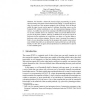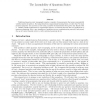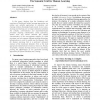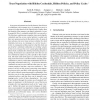130 search results - page 8 / 26 » Learning to Trust |
SEMWEB
2005
Springer
15 years 5 months ago
2005
Springer
Abstract. We introduce a framework, based on logic programming, for preferential reasoning with agents on the Semantic Web. Initially, we encode the knowledge of an agent as a logi...
102
click to vote
ECCC
2006
14 years 11 months ago
2006
Traditional quantum state tomography requires a number of measurements that grows exponentially with the number of qubits n. But using ideas from computational learning theory, we...
104
click to vote
CCGRID
2005
IEEE
15 years 5 months ago
2005
IEEE
In this paper, starting from the limitations and constrains of traditional human learning approaches, we outline new suitable approaches to education and training in future knowle...
113
click to vote
OSDI
2002
ACM
15 years 12 months ago
2002
ACM
Farsite is a secure, scalable file system that logically functions as a centralized file server but is physically distributed among a set of untrusted computers. Farsite provides ...
NDSS
2006
IEEE
15 years 5 months ago
2006
IEEE
In an open environment such as the Internet, the decision to collaborate with a stranger (e.g., by granting access to a resource) is often based on the characteristics (rather tha...




